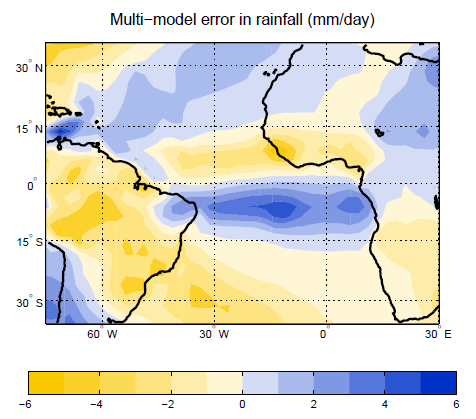Context

The tropical Atlantic experienced persistent climate change during the last century together with pronounced multi-decadal shifts. The largest oceanic changes were in the eastern boundary upwelling systems (EBUS). African countries bordering the Atlantic depend strongly upon their ocean for societal development, fisheries, and tourism. They were strongly affected by these climatic changes and will face important adaptations associated with future global change. Fisheries in the region are crucially important for the livelihoods of these countries and experience additional pressure through foreign, including EU, fishing fleets. These upwelling regions, among the most productive around the world, are also of great climatic importance, as here cloud feedbacks involving marine stratocumulus are key to regulating global climate. Furthermore, tropical Atlantic sea surface temperature (SST) variations have been linked to climatic extremes, including droughts in Africa, Europe, America, and Asia, as well as changes in Atlantic Hurricanes. They may also influence the El Niño Southern Oscillation (ENSO).

Unfortunately, the tropical Atlantic is a region of key uncertainty in the climate system: state-of-the-art climate models exhibit large systematic error; large uncertainties exists in the relative roles of internal and external factors in shaping climate change; and it is largely unknown how marine ecosystems respond to climate variability and how climate change will impact them. As a consequence, model based prediction of tropical Atlantic climate and its global socio-economic impacts are highly uncertain on all timescales. The magnitude of the problem and the need to resolve it is internationally recognised. PREFACE takes on the challenge to redress this situation through the first comprehensive assessment of the Tropical Atlantic. Together European and African expertise will combine regional and global scale modelling capabilities, field experiments and observation systems to address the following:
Objectives
- To reduce uncertainties in our knowledge of the functioning of tropical Atlantic climate, particularly of climate-related ocean processes and dynamics, coupled ocean, atmosphere, and land interactions; and internal and externally forced climate variability;
- To better understand the impact of model systematic error and its reduction on seasonal-to-decadal climate predictions and on climate change projections;
- To improve the simulation and prediction of tropical Atlantic climate on seasonal, and longer time scales, and contribute to better quantification of climate change impacts in the region;
- To improve understanding of the cumulative effects of the multiple stressors of climate variability, greenhouse gas induced climate change (including warming and deoxygenation), and fisheries on marine ecosystems, functional diversity, and ecosystem services (e.g., fisheries) in the tropical Atlantic;
- To assess the socio-economic vulnerabilities and evaluate the resilience of the welfare of West African fishing communities to climate-driven ecosystem shifts and global markets.
How will PREFACE achieve this? What are its specific objectives?
Expected Results
- Improved understanding of variability in the Eastern Boundary Upwelling regions and the Gulf of Guinea;
- Improved climate modelling and prediction capabilities;
- Better understanding of the function of marine ecosystem so that socio-economic impacts can be better predicted;
- Enhance cooperation between European and African researchers working on Tropical Atlantic climate and its impacts, by fostering existing collaborations and improving project synergy.
